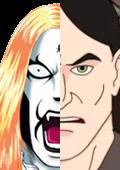 The @#$%ing Death Metal showdown that had to happen! It’s Kiminori Wakasugi’s Detroit Metal City versus Metalocalypse Dethklok created by Brendan Small, in our most explicit episode ever! How is is possible for TWO Death Metal comedy franchises to suddenly appear at the same time?! Thanks to the flimsy pretext of a Dethklok licenced comic finally being published, Kumar and newcomer-to-the-show Dana discuss Metal, the @#$% joke filled DMC manga, Metal, the @#$% joke-free DMC live-action movie, and Metal; compared with the Dethklok TV show and comic (including Dethklok vs The Goon, written and drawn by Eric Powell), and Metal. Plus: how censoring yourself is totally @#$%ing UN-Metal!! @#$% on!!
The @#$%ing Death Metal showdown that had to happen! It’s Kiminori Wakasugi’s Detroit Metal City versus Metalocalypse Dethklok created by Brendan Small, in our most explicit episode ever! How is is possible for TWO Death Metal comedy franchises to suddenly appear at the same time?! Thanks to the flimsy pretext of a Dethklok licenced comic finally being published, Kumar and newcomer-to-the-show Dana discuss Metal, the @#$% joke filled DMC manga, Metal, the @#$% joke-free DMC live-action movie, and Metal; compared with the Dethklok TV show and comic (including Dethklok vs The Goon, written and drawn by Eric Powell), and Metal. Plus: how censoring yourself is totally @#$%ing UN-Metal!! @#$% on!!
Podcast: Play in new window | Download
Subscribe: | More
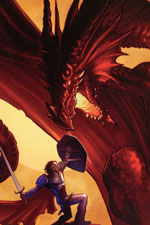 Is Dungeons and Dragons, a game that involves using your imagination to create an ongoing story, a good fit for a more “set” medium like comics? If you make the comic comprehensible only to D&D geeks, are the geeks any more likely to pick it up? D&D adherent Dana and lapsed adherent Kumar discuss.
Is Dungeons and Dragons, a game that involves using your imagination to create an ongoing story, a good fit for a more “set” medium like comics? If you make the comic comprehensible only to D&D geeks, are the geeks any more likely to pick it up? D&D adherent Dana and lapsed adherent Kumar discuss.

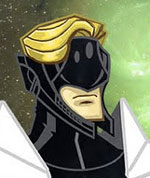 Tom Rasch is working on a comic, animated cartoon, and toy line for his property
Tom Rasch is working on a comic, animated cartoon, and toy line for his property 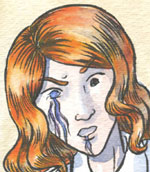 A society infested and defined by smokelike spirits, and high school factionalized by the issue, make up L.S. Zwarenstein’s “Geist”. Tim and Mulele critique.
A society infested and defined by smokelike spirits, and high school factionalized by the issue, make up L.S. Zwarenstein’s “Geist”. Tim and Mulele critique.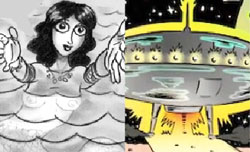 A mermaid, the Hudson River, and 19th century riverboats are the focus of Mark Siegel’s
A mermaid, the Hudson River, and 19th century riverboats are the focus of Mark Siegel’s 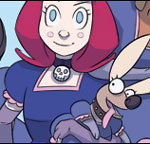 FLASHBACK! So many comics on the Web. What’s worth reading and what isn’t? Tim and Mulele critique four Web comics, pointing out what’s good and bad about each — from a reader’s perspective, as well as a creator’s. (Originally published June 1, 2009)
FLASHBACK! So many comics on the Web. What’s worth reading and what isn’t? Tim and Mulele critique four Web comics, pointing out what’s good and bad about each — from a reader’s perspective, as well as a creator’s. (Originally published June 1, 2009) What would happen if chickens suddenly gained human intelligence?
What would happen if chickens suddenly gained human intelligence? 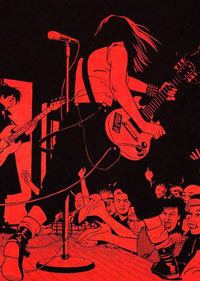 The series Love & Rockets, featuring individual works by the Hernandez brothers, started in 1981 as a self-published magazine, but was quickly picked up by Fantagraphics. Over the last 30 years, the brothers’ work has continued to develop & astound. This week Tim and Kumar take a look at the Love & Rockets work of Jaime Hernandez, with special guest (and former Fantagraphics employee)
The series Love & Rockets, featuring individual works by the Hernandez brothers, started in 1981 as a self-published magazine, but was quickly picked up by Fantagraphics. Over the last 30 years, the brothers’ work has continued to develop & astound. This week Tim and Kumar take a look at the Love & Rockets work of Jaime Hernandez, with special guest (and former Fantagraphics employee) 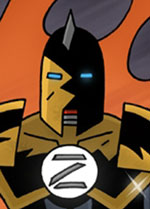 A couple months ago on Deconstructing Comics,
A couple months ago on Deconstructing Comics,  The @#$%ing Death Metal showdown that had to happen! It’s Kiminori Wakasugi’s Detroit Metal City versus Metalocalypse Dethklok created by Brendan Small, in our most explicit episode ever! How is is possible for TWO Death Metal comedy franchises to suddenly appear at the same time?! Thanks to the flimsy pretext of a Dethklok licenced comic finally being published, Kumar and newcomer-to-the-show Dana discuss Metal, the @#$% joke filled DMC manga, Metal, the @#$% joke-free DMC live-action movie, and Metal; compared with the Dethklok TV show and comic (including Dethklok vs The Goon, written and drawn by Eric Powell), and Metal. Plus: how censoring yourself is totally @#$%ing UN-Metal!! @#$% on!!
The @#$%ing Death Metal showdown that had to happen! It’s Kiminori Wakasugi’s Detroit Metal City versus Metalocalypse Dethklok created by Brendan Small, in our most explicit episode ever! How is is possible for TWO Death Metal comedy franchises to suddenly appear at the same time?! Thanks to the flimsy pretext of a Dethklok licenced comic finally being published, Kumar and newcomer-to-the-show Dana discuss Metal, the @#$% joke filled DMC manga, Metal, the @#$% joke-free DMC live-action movie, and Metal; compared with the Dethklok TV show and comic (including Dethklok vs The Goon, written and drawn by Eric Powell), and Metal. Plus: how censoring yourself is totally @#$%ing UN-Metal!! @#$% on!!